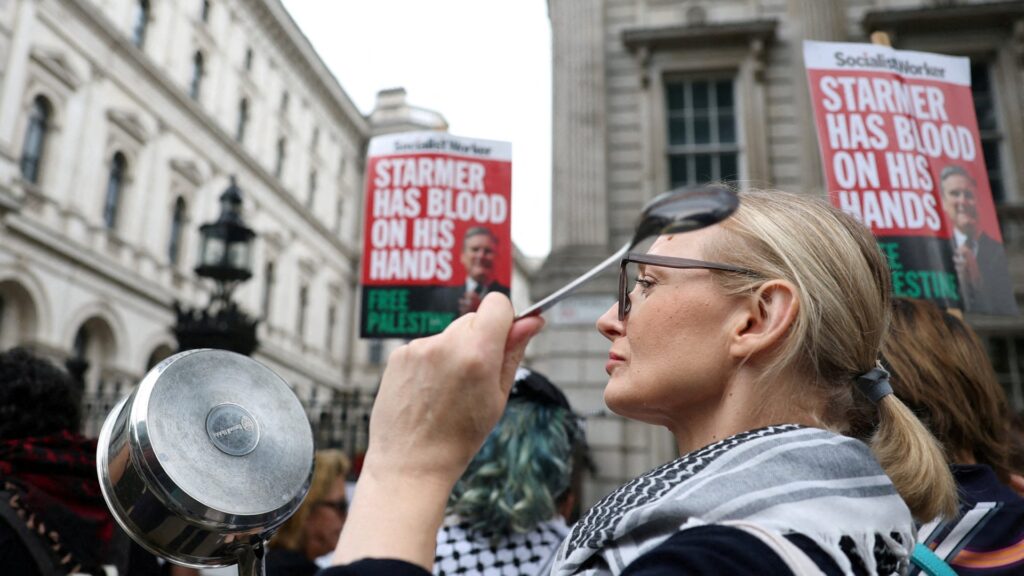British Prime Minister Keir Starmer’s announcement on Tuesday that the UK intends to recognise a Palestinian state by September presents itself as a significant diplomatic shift.
However, a closer examination reveals this to be a conditional statement, not a genuine step towards justice or an end to the brutal realities in Gaza and the Occupied West Bank.
This move risks functioning as a distraction, obscuring the UK’s complicity and absolving it of its historical and legal responsibilities.
While Gaza’s civilians starve under siege, the UK government dangles a conditional promise of statehood.
Israel’s assault on Gaza has been catastrophic, with over 60,000 Palestinians killed since October 2023, and the UN agency for Palestinian refugees (Unrwa) stating the starvation of the people of Gaza is “manufactured and man-made”.
New MEE newsletter: Jerusalem Dispatch
Sign up to get the latest insights and analysis on
Israel-Palestine, alongside Turkey Unpacked and other MEE newsletters
There is, for all to see, a genocide unfolding. Yet, Starmer’s response has been to pledge recognition of Palestine only if Israel first meets an extensive checklist: a ceasefire, unimpeded aid deliveries, a halt to West Bank annexations, and more.
These demands are themselves basic duties under international law, not extra concessions.
Moral failure
Making Palestinian statehood contingent on Israel’s compliance with legal norms is a profound moral failure. It sends a dangerous message, that Palestinians can only have their basic rights if their occupier allows it.
Recognition cannot and must not be a reward for halting war crimes. Self-determination is not conditional; it is an inalienable right. This long-overdue move, cloaked in conditions, is nothing short of an insult to Palestinian dignity.
Making Palestinian statehood contingent on Israel’s compliance with legal norms is a profound moral failure
Public opinion in the UK already reflects this sentiment. Recent polling shows that 45 percent of Britons support recognising a Palestinian state, with only 14 percent opposed.
There is also growing pressure for the government to take a stronger stance against Israel’s actions.
Starmer’s declaration that recognition depends on Israel taking “substantive steps to end the appalling situation in Gaza” is not a policy of principle, it is political triangulation.
It attempts to placate growing public discontent while avoiding any real confrontation with Israel’s system of apartheid, occupation and genocide.
Realities on the ground
The UK’s posture becomes even more indefensible when viewed against the backdrop of international legal pronouncements. In January 2024, the International Court of Justice (ICJ) found “plausible genocide” in Gaza, calling explicitly on all states to act to prevent it.

Trump, Starmer, Macron: A theatre of inhumanity
Read More »
Furthermore, in July 2024, the ICJ issued an advisory opinion affirming the illegality of Israel’s occupation of Palestinian territories, including East Jerusalem, and found that its policies amounted to violations of international law, including apartheid and unlawful settlement expansion.
Despite these clear rulings, the UK has continued to arm and support Israel.
A recent investigation revealed that since September 2024, the UK has sent 8,630 separate munitions to Israel, including components for F-35 fighter jets – after claiming to have suspended arms exports.
MPs have raised serious concerns that the government has misled parliament, risking British complicity in war crimes.
At the United Nations, the UK frequently abstains from votes calling for an end to the occupation, citing the need for a “negotiated two-state solution”. But refusing to uphold binding legal obligations while providing military and diplomatic cover for a state accused of genocide is not neutrality, it is complicity.
Worse still, the very framework for recognition being proposed is detached from the realities on the ground.
Under international law, a state must have a permanent population, defined territory, effective governance, and the capacity to enter into relations with other states.
The Palestinian people are fragmented, some besieged in Gaza, others under military rule in the West Bank, and over 5 million languish in refugee camps across the region.
The territory proposed for recognition is fractured, non-contiguous, and entirely surrounded and subject to Israeli control. Recognising a Palestinian state under these conditions amounts to a facade, providing Israel with a veneer of compromise while it entrenches its colonisation.
A radical change
If the UK is serious about justice, its approach must change radically. Words of conditional recognition are not enough.
The UK must demand an immediate and unconditional end to the siege of Gaza.
This isn’t statehood, it’s political theatre masking Israeli crimes against humanity
It must acknowledge that Israel is practising apartheid and occupation, impose sanctions on Israel for violations of international law, recognise the Palestinian right of return and free Masjid Al-Aqsa (Al-Aqsa Mosque) from Israeli control.
Anything less is a distraction and appeasement.
Starmer’s Palestine is just 22 percent of historic Palestine, but with some 700,000 Jewish squatters living in 150 settlements and 128 outposts across the West Bank, it is more likely to be 12 percent, and even that comes with conditions.
Starmer’s proposal is a continuation of Britain’s role in Palestinian dispossession, dating back to the 1917 Balfour Declaration.
You don’t correct injustice by recognising its fragments. You end the system that created it. This isn’t statehood, it’s political theatre masking Israeli crimes against humanity.
The views expressed in this article belong to the author and do not necessarily reflect the editorial policy of Middle East Eye.

